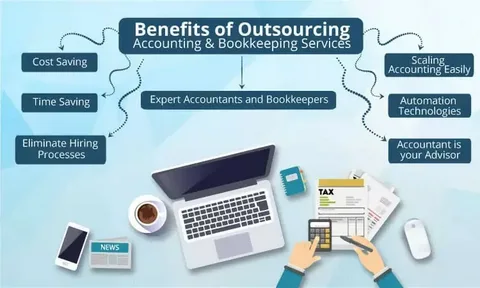Running a small business comes with many challenges and limited resources. One of the most important functions that often causes stress is managing finances. Thankfully businesses can turn to outsourcing accounting services for small business to reduce administrative burden, maintain compliance, and gain financial clarity. For a UK firm operating in London, Manchester, or beyond, outsourcing with a specialist provider based in the UK offers both proximity and understanding of local regulations.
When a small business chooses to offload its accounting tasks, it can free up internal staff to focus on sales, customer service, innovation, or growth. Moreover expert providers understand VAT, payroll tax filings, HMRC deadlines, and statutory requirements better than businesses that attempt accounting in-house without proper training. Outsourcing accounting services for small businesses helps avoid costly mistakes, improves cash flow visibility, and ensures books are accurate and timely.
A strong option to consider is a company that already has experience serving UK-based clients such as finexoutsourcing. Such providers combine technical expertise, secure platforms, and tailored service levels depending on business size. By choosing professionals who specialise in small business accounting outsourcing, companies can secure stability and build trust over time.
This guide lays out what to look for when deciding to outsource accounting services, how to evaluate providers, what services you might need, and how to ensure that outsourcing accounting services for small business delivers value rather than headaches.
Determine What Accounting Tasks You Need
Before engaging with any service provider, break down your accounting needs. Some small businesses require only basic bookkeeping, invoice processing, and payroll. Others need deeper involvement in financial forecasting, budget preparation, or compliance audits.
Things to clarify:
- Which tasks you want to outsource (invoicing, bank reconciliations, payroll, VAT returns)
- Frequency of reporting and updates
- What software or systems you’re already using or plan to use
Knowing clearly what you need helps avoid paying for unnecessary services. It also ensures the provider is well matched to your situation. Outsourcing accounting services for small business works best when expectations are defined in advance.
Evaluate Expertise and Local Knowledge
Small businesses in the UK benefit when their accounting partner understands regional regulations, tax laws, and financial reporting standards. A provider familiar with HMRC obligations, Companies House filings, and VAT thresholds is invaluable.
Look for firms that have a track record of supporting UK small businesses, including those in your industry or location. Providers like finexoutsourcing often list case studies or testimonials from clients in similar sectors which helps you assess their expertise and reliability.
Check Technology And Security Practices
Modern outsourced accounting depends heavily on digital tools. Choosing a provider that uses secure cloud platforms ensures real time data access, automated workflows, and streamlined collaboration.
Ensure the provider:
- Uses reputable accounting software compatible with your needs
- Implements data security and privacy best practices, meeting GDPR standards
- Offers remote access or dashboard views so you can monitor your finances anytime
These features make outsourcing accounting services for small businesses smoother, more transparent, and less prone to error.
Compare Cost Versus Value
Outsourcing will cost something, but the key is whether the value you gain outweighs the expense. When comparing providers:
- Request quotes based on the services you need rather than a generic package
- Check for hidden fees such as onboarding, data migration, or additional reports
- Consider savings in terms of time, reduced errors, and better tax compliance
A provider that offers efficient service often delivers better return than one simply cheapest.
Review Certification And Regulatory Compliance
Ensure the provider is properly certified and follows accounting industry standards. In the UK that may include membership in bodies such as:
- Association of Accounting Technicians (AAT)
- Institute of Chartered Accountants in England and Wales (ICAEW)
- Chartered Institute of Management Accountants (CIMA)
Also check for GDPR compliance, secure handling of data, and insurance or indemnity cover. Such credentials reduce risk for your small business when outsourcing accounting services for small businesses.
Communication And Support Levels
Clear communication is essential. You’ll want a provider who:
- Assigns a dedicated contact or team
- Provides regular financial updates or summaries
- Responds quickly to queries or issues
Support might include training on using reporting dashboards, or walking you through tax obligations. Providers like finexoutsourcing often emphasise support as part of their offering. That helps build trust.
Read More: Why More Companies Choose to Finance Outsource Their Operations
Conclusion
Outsourcing accounting services for small businesses can transform how a UK-based business manages its finances. By defining your needs clearly, selecting a provider with local expertise, using secure technology, ensuring certifications, and evaluating cost versus value, you can shift accounting from a burden to a competitive advantage.
A provider such as finexoutsourcing that understands UK regulations, small business constraints, and service expectations becomes more than just an external resource, it becomes a financial partner. When done well, outsourcing accounting services for small businesses enhances accuracy, compliance, and frees up energy to focus on growth.
FAQs
- What services are typically included when outsourcing accounting for a small business
They often include bookkeeping, payroll, VAT filings, financial reporting, bank reconciliations, and sometimes tax return preparation. It depends on your scope. - Is outsourcing accounting more affordable than hiring in-house staff
Often it is, especially when you factor in salaries, benefits, training, software costs, and overheads. Outsourcing usually offers flexibility and cost control. - How do I ensure the outsourced provider handles my data securely
Ask about GDPR compliance, data encryption, secure back-ups, and data access protocols. Review their policies on confidentiality and ask for evidence or certification. - What risks should I watch out for when outsourcing accounting
Risks include miscommunication of responsibilities, hidden fees, lack of transparency, or choosing a provider without sufficient UK-based regulatory knowledge. Clear agreements and references help mitigate these risks.
